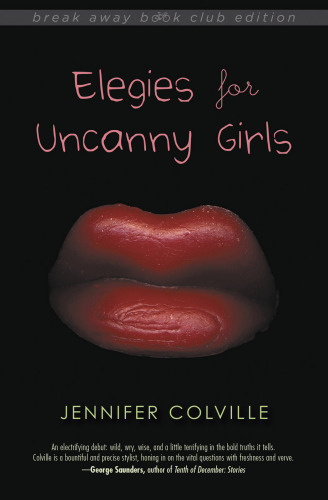
Elegies for Uncanny Girls
Break Away Book Club Edition
کتاب های مرتبط
- اطلاعات
- نقد و بررسی
- دیدگاه کاربران
نقد و بررسی

Starred review from October 29, 2012
There are only eight stories in Russell’s new collection, but as readers of Swamplandia! know, Russell doesn’t work small. She’s a world builder, and the stranger the better. Not that she writes fantasy, exactly: the worlds she creates live within the one we know—but sometimes they operate by different rules. Take “The Seagull Army Descends on Strong Beach, 1979”: Nal, its main character, is your basic dejected 14-year-old boy whose brother gets the girls and whose mother has more or less given up; “Nal was a virgin. He kicked at a wet clump of sand until it exploded.” But in this beach town, the seagulls have secrets. Or consider “The Graveless Doll of Eric Mutis,” a story of high school bullying that extends a familiar plot line in eerie and convincing ways. Similarly, “The New Veterans,” in which a middle-aged masseuse works on a young Iraq War vet haunted by his buddy’s death, blurs horror, the genre, with the horror of daily life. Is the masseuse losing her mind? Is the vet? What about those ignoring the war entirely? Perhaps the answers lie in the veteran’s muddy, whole-back tattoo: “Light hops the fence of its design. So many colors go waterfalling down the man’s spine that, at first glance, she can’t make any sense of the picture.” While this story runs a little long, and the otherwise excellent “Proving Up” doesn’t need its final gothic touch, Russell’s great gift—along with her antic imagination—who else would give us a barn full of ex-presidents reincarnated as horses?—is her ability to create whole landscapes and lifetimes of strangeness within the confines of a short story. Agent: The Denise Shannon Literary Agency.

November 21, 2016
The 10 resonant tales in Colville’s debut depict the inner lives of mothers, daughters, sisters, brothers, and the occasional best friend. The opener, “Other Mothers,” tells the story of a newly minted Ph.D.’s desperate worry for her infant, with knowing wit and exceptional figurative language. In “Center,” an aspiring poet/scholar visits her brother, a struggling artist now supported by his wife, and Colville’s crisp, revealing dialogue delves into the adoration and resentment of siblinghood. Sibling strife also informs the shorter “Costume” and “Dora,” and the longer “Winona,” in which the titular teenager comes of age surrounded by her overly enamored younger brother, her unintentionally caustic mother, and Norm, her symbolically named father, who objectifies his wife and daughter while depending on their domestic labor. A few stories feature fantastical elements—Jill in “Jill, or the Big Little Lady,” for instance, fluctuates from Barbie-sized to giantess—but these daring inventions don’t always pay off. The endings, likewise, range from the transcendent benediction of the wistful quasi-romance “When Maggie Thinks of Matt” to the inelegant moral of “Audra,” a playground drama about friendship and class. Still, the book as a whole is brisk, satisfying, and fiercely observant.

Starred review from November 15, 2012
A consistently arresting, frequently stunning collection of eight stories. Though Russell enjoyed her breakthrough--both popular and critical--with her debut novel (Swamplandia!, 2011), she had earlier attracted notice with her short stories (St. Lucy's Home for Girls Raised by Wolves, 2006). Here, she returns to that format with startling effect, reinforcing the uniqueness of her fiction, employing situations that are implausible, even outlandish, to illuminate the human condition. Or the vampire condition, as she does in the opening title story, where the ostensibly unthreatening narrator comes to term with immortality, love and loss, and his essential nature. Then there's "The Seagull Army Descends on Strong Beach, 1979," about a 14-year-old boy's sexual initiation during a summer in which he is so acutely self-conscious that he barely notices that his town has been invaded by sea gulls, "gulls grouped so thickly that from a distance they looked like snowbanks." Perhaps the most ingenious of this inspired lot is "The New Veterans," with a comparatively realistic setup that finds soldiers who are returning from battle given massages to reduce stress. In one particular relationship, the elaborately tattooed back of a young veteran provides a narrative all its own, one transformed by the narrative process of the massage. The interplay has profound implications for both the masseuse and her initially reluctant patient; both discover that "healing hurts sometimes." The two shortest stories are also the slightest, though both reflect the seemingly boundless imagination of the author. "The Barn at the End of Our Term" finds a seemingly random group of former presidents in denial (at both their loss of power and the fact that they have somehow become horses), and "Dougbert Shackleton's Rules for Antarctic Tailgating" presents the "Food Chain Games" as the ultimate spectator sport. With the concluding "The Graveless Doll of Eric Mutis," about a group of teenage bullies and an urban scarecrow, the fiction blurs all distinction between creative whimsy and moral imperative. Even more impressive than Russell's critically acclaimed novel.
COPYRIGHT(2012) Kirkus Reviews, ALL RIGHTS RESERVED.

September 15, 2012
The New Yorker's 20 Under 40. Granta's Best Young American Novelists. The National Book Foundation's 5 Under 35. Russell surely has had a stellar career, straight out of the gate. Her new collection echoes the witty lusciousness of her first novel, Pulitzer finalist Swamplandia! (also a New York Times and a No. 1 Indie Next best seller and a New York Times Book Review Top Ten); the title piece features two vampires whose 100-year-old marriage is on the skids because one has developed a fear of flying. A few stories, like those about abandoned children, lose the wit and lusciousness and go all dark.
Copyright 2012 Library Journal, LLC Used with permission.

























دیدگاه کاربران